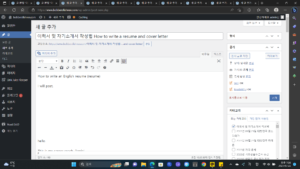These days, there are many people who are interested in foreign companies or overseas employment in Korea. How to write a resume and self-introduction letter is a document that must be prepared, but are you confused about exactly how to write it? Before you blindly translate your Korean resume into English, did you know that Resume also has a commonly used format?

이력서 및 자기소개서 작성법
Foreign companies
Let’s take a closer look at what a good resume should contain, what tips to write, and what forms Harvard graduates use to prepare for employment.
1. What is a good resume?
Resume
Basically, a good resume should be able to answer two questions:
1. Am I interested in this company and job?
2. Am I suitable for the company’s ideal talent and job?
Companies don’t want applicants who are only passionate about the job, without the skills needed for the job. However, applicants who seem to have no understanding or interest in our company, even though they have fancy specifications, will not be attractive. Therefore, we must be able to appeal both passion and job fit in our employment documents.
Usually, when applying for multiple companies/positions at the same time, there are many people who submit the same resume in one version and only change the cover letter. From the perspective of the HR team of a company that faces dozens or hundreds of applicants, it is inevitable that which resume is a resume written only for our company and which is a universal mass-produced resume. Therefore, even if it is a little cumbersome, it is necessary to make an effort to customize the resume according to each company/position.
2. Structure of Resume (Resume in English)
Resume must be concise and written on one page of A4 paper. If it is too short, it looks insincere, and if it is too long, there is no impact, and it can tire (?) the personnel manager.
If you are going to fill in just one page, what should you write? Resume can consist of the following items. There are items that must be included as required, and there are items that can be added or subtracted selectively depending on the job you are applying for or the points you want to appeal to suit your situation.
Header [required]
Short self-introduction / Introduction [optional]
Education / Education [required]
Career details / Professional Experiences [required]
Leadership & Activities / Leadership & Activities [optional]
Awards or certifications [optional]
Skills & Interests / Skills & Interests [optional]
For example, for newcomers who are trying to find a full-time job for the first time, if there is not much to put in the ‘career details’, you can include the “internal and extracurricular activities” that you participated in during your college days. In particular, if you have done activities that reveal the soft skills commonly required by companies, such as leadership, interpersonal relationships, and volunteer spirit, you can become your own weapon. As another example, if I’m trying for a position where I can show off my winnings in a contest, such as a designer or writer, it would be a good idea to actively utilize the ‘Awards’ field!
3. Tips for writing a Resume (Resume in English)
Let’s write a recipe
1) Leave an impressive ‘self-introduction / Introduction’!
It’s good to make an impact by starting with a 2-3 sentence introduction about who you are, what your area of expertise is, and what your future career goals are at the top. For example:
I am a digital marketing specialist with 10+ years of experience in the entertainment industry. I am proficient in using Google Analytics to track and analyze web traffic. My career goal is to help B2C companies grow through data-driven online marketing.
I am a digital marketer with over 10 years of experience in the entertainment industry. I excel at tracking and analyzing web traffic using Google Analytics tools. My career goal is to help B2C companies grow through data-driven online marketing.
2) ‘Career Details / Professional Experience’ is an active form, emphasizing quantitative achievements!
When describing your career, you should write in the ‘active voice’ type, specifically what you have done and what tools you have used. Also, if you actively use numbers to express the importance or performance of the work you did and write quantitatively, your trust in me will increase. For example:
– Analyzed (active “analyze”) customer segments of an online retail website with an average of 15,000 daily visitors (importance of my job) using Google Analytics (tools/skills I utilized) to inform most profitable segments (results/achievements) )
3) In ‘Skills & Interests’, write down your proficiency as well!
When listing my skills, such as my language and computer, I should also list my approximate proficiency. You may be asked to take a test during or after an interview, so don’t exaggerate! Let’s write honestly. for example:
-Language Skills: Fluent in Korean, business proficient in English, conversational in Japanese
-Language ability: Fluent in Korean, Business Conversation in English, Japanese Conversation
4. Resume (Resume in English) download form (feat. Ivy League students)
Harvard University
Lastly, we attach a resume form that is recommended for direct distribution and use by students from the Harvard University Employment Office. You can believe that American Ivy League graduates are preparing for employment with this form, right? After downloading, I hope you use it well to create your own recipe.